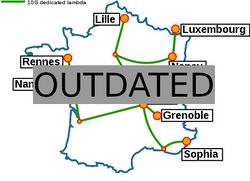Grid5000:Home: Difference between revisions
No edit summary |
No edit summary |
||
| Line 9: | Line 9: | ||
Key features: | Key features: | ||
* provides '''access to a large amount of resources''': 1000 nodes, 8000 cores, grouped in homogeneous clusters, and featuring various technologies: 10G Ethernet, Infiniband, GPUs, Xeon PHI | * provides '''access to a large amount of resources''': 1000 nodes, 8000 cores, grouped in homogeneous clusters, and featuring various technologies: 10G Ethernet, Infiniband, GPUs, Xeon PHI | ||
* '''highly reconfigurable and controllable''': researchers can experiment with a fully customized software stack thanks to bare-metal deployment features, and can isolate their experiment at the networking | * '''highly reconfigurable and controllable''': researchers can experiment with a fully customized software stack thanks to bare-metal deployment features, and can isolate their experiment at the networking layer | ||
* '''advanced monitoring and measurement features for networking and power consumption''', to provide a deep understanding of experiments | * '''advanced monitoring and measurement features for networking and power consumption''', to provide a deep understanding of experiments | ||
* '''designed to support Open Science and reproducible research''', with full traceability of infrastructure and software changes on the testbed | * '''designed to support Open Science and reproducible research''', with full traceability of infrastructure and software changes on the testbed | ||
Revision as of 22:46, 22 January 2015
|
Grid'5000 is a large-scale and versatile testbed for experiment-driven research in all areas of computer science, with a focus on parallel and distributed computing including Cloud, HPC and Big Data. Key features:
|
Latest publications from Grid'5000 users
Five random publications that benefited from Grid'5000 (at least 2933 overall):
- Lucian Trestioreanu, Flaviene Scheidt, Wazen M. Shbair, Jerome Francois, Damien Magoni, et al.. To Squelch or not to Squelch: Enabling Improved Message Dissemination on the XRP Ledger. 37th IEEE/IFIP Network Operations and Management Symposium (NOMS 2024), May 2024, Séoul, South Korea. hal-04621124 view on HAL pdf
- Célia Mahamdi. Multi-Consensus distribué : agrégation et révocabilité. Réseaux et télécommunications cs.NI. Sorbonne Université, 2024. Français. NNT : 2024SORUS426. tel-04919363 view on HAL pdf
- Maurice Brémond, Hugo Brunie, Laurent Debreu, Rupert W Ford, Florian Lemarié, et al.. Poseidon: A Source-to-Source Translator for Holistic HPC Optimizations of Ocean Models on Regular Grids. SC 2024 - International Conference for High Performance Computing, Networking, Storage, and Analysis, Nov 2024, Atlanta (Georgia), United States. , pp.1-1, 2024, 10.5281/zenodo.11190458. hal-04811677 view on HAL pdf
- Augustin Bariant, Jules Baudrin, Gaëtan Leurent, Clara Pernot, Léo Perrin, et al.. Fast AES-Based Universal Hash Functions and MACs. IACR Transactions on Symmetric Cryptology, 2024, 2024 (2), pp.35-67. 10.46586/tosc.v2024.i2.35-67. hal-04710478 view on HAL pdf
- Guillaume Rosinosky, Donatien Schmitz, Etienne Rivière. StreamBed: Capacity Planning for Stream Processing. DEBS 2024 - 18th ACM International Conference on Distributed and Event-based Systems, Jun 2024, Lyon, France. pp.90-102, 10.1145/3629104.3666034. hal-04708354 view on HAL pdf
Latest news
Grid'5000 tutorial days in Lille
We are happy to let you known that tutorials around Grid'5000 will be organized in Lille on November 20th, 2014, with a few seats available for people outside Lille. All information on the dedicated web page.
Grid'5000 spring school now finished
The Grid'5000 spring school took place between June 16th, 2014 and June 19th, 2014 in Lyon. Three awards were given for presentation or challenge entries (the challenge entries ended as a tie):
|
Best presentation award to Miguel Liroz Gistau, Reza Akbarinia and Patrick Valduriez |
Best challenge entry to Tomasz Buchert, Emmanuel Jeanvoine and Lucas Nussbaum |
Best challenge entry to Jonathan Pastor and Laurent Pouilloux |
Grid'5000 sites
Current funding
As from June 2008, INRIA is the main contributor to Grid'5000 funding.
INRIA |
CNRS |
UniversitiesUniversity Joseph Fourier, Grenoble |
Regional councilsAquitaine |





